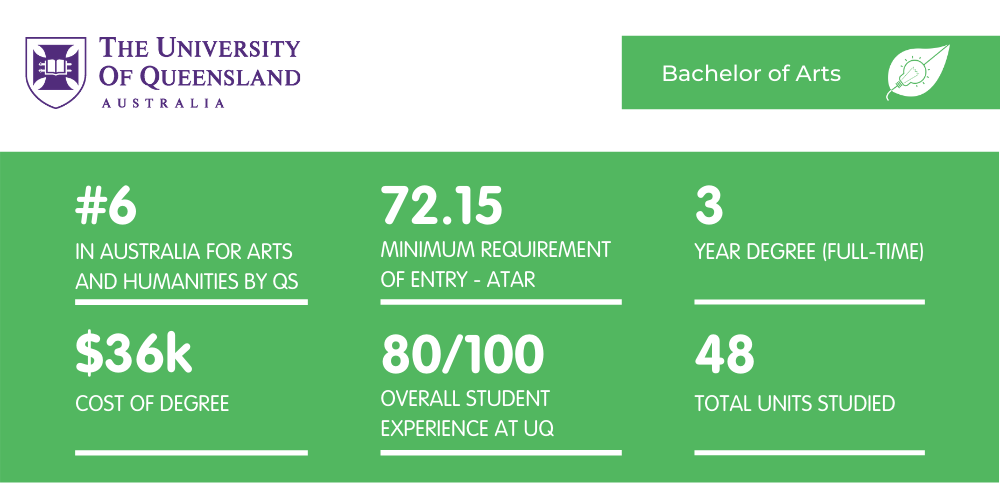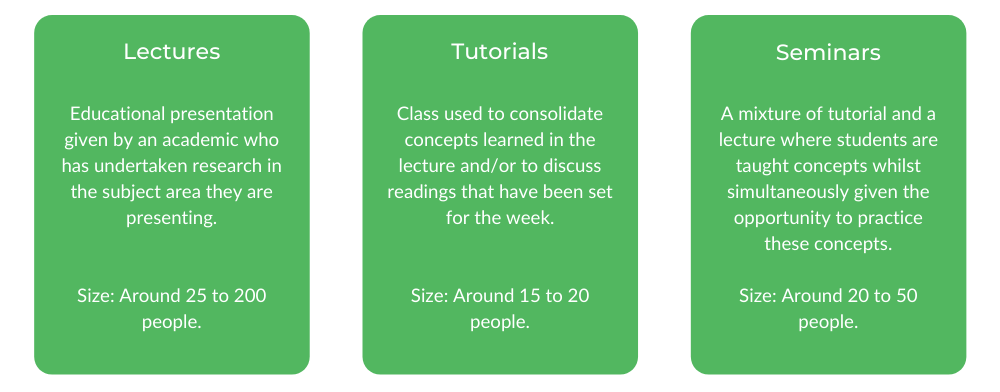
POV: You’re interested in applying for a degree relating to Arts and Humanities but, you’re not quite sure what your best options are. Perhaps, knowing what a Bachelor of Arts at UQ encompasses will help you reach your decision!
In this article, we’ll be guiding you through the essentials of this degree.
So, if you want to know more, let’s dive in!
What is a Bachelor of Arts at UQ?
Core Units and Majors
How to Get into a Bachelor of Arts at UQ
What’s the Teaching Format?
What’s the Faculty and Culture Like?
What is a Bachelor of Arts at UQ?
A Bachelor of Arts at UQ is a versatile creative-based degree where students get the choice to focus on the study areas of humanities, social sciences, languages or a combination of the three! The degree is designed to be flexible and interdisciplinary so that graduates have a wide set of career possibilities, depending on their major(s).
While the degree doesn’t have to be studied as a double degree, it is definitely advantageous if you’d like to gain an interdisciplinary skill-set at the end of your program. A Bachelor of Arts at UQ can be studied with the following degrees:
-
- Bachelor of Journalism
- Bachelor of Computer Science
- Bachelor of Commerce
- Bachelor of Information Technology
- Bachelor of Communication
- Bachelor of Social Science
- Bachelor of Engineering (Honours)
- Bachelor of Business Management
- Bachelor of Education
- Bachelor of Economics
- Bachelor of Tourism, Hospitality and Event Management
- Bachelor of Science
- Bachelor of Mathematics
- Bachelor of Laws (Honours)
- Bachelor of Music (Honours)
Honours
For a deeper understanding of their degree, graduates can also opt to study an additional one-year Honours program; this requires a pass completion of the BA, with a GPA of 5 or above.
Career Paths
A Bachelor of Arts at UQ opens doors to different career pathways. Where graduates end up typically depends on the major(s) they studied.
For example, an Arts History major can look into roles as an Arts and cultural facilitator. These are a few general options:
-
- Education administration officer
- Communication and engagement officer
- Ghostwriters
- Editors
- Local history technician
- Academic researcher
Core Units and Majors
At UQ, the core units you do as part of your degree will depend on your major(s). There is a large range of majors including (the full list can be found here):
What’s an English Literature major like?
In an English Literature major, some of the core units are Contemporary Literature: Reading and Writing, Literary Classics: Texts and Traditions and Australian Literature.
Contemporary Literature: Reading and Writing is a core unit that introduces popular contemporary genres and literary trends in the twenty-first century. Literary Classics: Texts and Traditions is a first-year core unit where study focuses on literary history and evolution of the three major genres of drama, poetry, and prose fiction.
What’s a Writing major like?
In a Writing major, core units include Narrative Fiction and Grammar, Syntax and Style. Narrative Fiction is an introductory first-year unit to writing short-form narrative prose, where students do weekly writing exercises in class and complete a short story as their final assessment.
In the spirit of ‘knowing the rules to break them’, Grammar, Syntax and Style first revisits the rules of grammar and invites students to break convention as a stylistic choice in their writing.
How to Get into a Bachelor of Arts at UQ
For those who are interested in applying for a Bachelor of Arts at UQ, the entry score threshold is an ATAR of 80. This is equivalent to an OP (Overall Position) — the measure of tertiary entry in Queensland, of 12.
While there are no pathway programs, the Subject Incentive Scheme offers up to 5 adjustment points if you have studied and achieved a grade of C or higher in Queensland Specialist Mathematics (that is Mathematics Extension 1 or 2) or a Language other than English.
Assumed Knowledge
The assumed knowledge for a Bachelor of Arts at UQ is any two units of English, and there are no additional assessments for entry.
Scholarships
Being granted a scholarship can be a great source of financial assistance and addition to your CV.
For a Bachelor of Arts at UQ, the UQ Link Scholarship is available for students who have experienced educational disadvantage due to financial hardship, where the recipient is awarded $3,000 per year for up to 3 years.
The UQ LGBTIQ+ Bursary also grants certain awards (in 2020, they ranged from approximately $500 to $1250).
What’s the Teaching Format?
A Bachelor of Arts at UQ is taught in semesters and typically in a combination of lectures, tutorials and seminars. So you’ll have two main academic sessions where your subjects will be spread among!
Class Structure

Lectures
Lectures set out a foundational overview of weekly topics; for example, in an English literature lecture, lecturers may introduce notable literary figures of a certain movement and draw upon quotes for textual analysis.
Lectures can have an attendance of 25 to 200 people — while they are timetabled for 90 minutes, they often end up being around 50 to 80 minutes long.
Tutorials
Tutorials are more in-depth than lectures and are often dependent on critical class discussion to get the most of the class. Here, students will answer the tutor’s questions, debate, work on exercises, and share their findings or responses with the class.
In a Writing major, students will also get an opportunity to “workshop” their creative projects, which entails giving and receiving constructive criticism of their drafts.
Tutorials have around 15 to 20 people and are usually 50 minutes long, although they are timetabled for one hour.
Seminars
At UQ, seminars are basically a mixture of both lecture and tutorial to the one class. These are often held for elective units such as Gender and Textuality.
There are approximately 20 to 50 people in one seminar and last 3 hours long (with one break).
How much time do you spend at uni?
In a Bachelor of Arts at UQ, each unit typically contains 3 hours of classes and the standard number of contact hours is 9 hours. Just remember that you’ll also have to factor in time to complete your assignments and homework outside of these contact hours.
Assessments
The main forms of assessment in a Bachelor of Arts at UQ differs in relation to a student’s chosen major. Music majors will have more exams, as well as Psychology majors.
However, for more sociological and humanities majors, most assessments are essays or written assessments. These weigh anything from 10-60% of the overall grade.
Exams are not very common in these majors, although sometimes there are (graded) open-book quizzes. Quizzes usually aren’t weighted more than 5%.
Skills That You Refine and Learn

In an Arts degree, students gain analytical knowledge in their major. They develop the discerning eye to critique their discipline and its limitations.
As every study area is always evolving in its knowledge, students learn to contribute to academic conversations through critical class discussions, tutorial exercises and written assessments.
Creative-thinking typically aligns with the creative-based majors. Especially in tutorials, students have the guidance of industry professionals to experiment and how to transform their ideas into different styles.
For any Arts major, prescribed readings are the main way of understanding their study area.
As they progress in their degree, students learn how to read academic language and use the terminology within their discipline. In reciprocity, students develop their capacity to write academically through their written assessments.
What’s the Faculty and Culture Like?
At UQ, a Bachelor of Arts is under the Humanities and Social Science faculty, which is a large and supportive faculty. The faculty also holds many events for different majors, such as guest lectures on Ancient Rome, career events and art webinars!
Most Arts students at UQ are known to be friendly and open-minded, offering both solidarity and support to their peers. Though they expect more self-directed responsibility in your university work, UQ Arts tutors can provide a lot of advice and guidance if asked — in most cases, people at UQ want to help if they know you are in need of it.

The Jacaranda Journal is UQ’s Arts magazine and is a perfect place for UQ students to publish their creative work in. They have a very supportive editorial team and can also be a great chance to showcase your editing skills!
Societies
The UQ English and Literature Society is highly popular amongst Arts students, especially for those who are doing Writing and/or English Literature majors. The society offers a mix of skill-based and leisure events such as Essay writing workshops and book-swap picnics!
If you’re interested in participating in altruistic events, the Refugee Tutoring Club has a volunteer-run program where UQ students provide tutoring sessions to young refugee people in high school and TAFE subjects. This can also provide transferable skills for any career pathway and would look favourable to your CV!
Support Programs
UQ offers mentoring programs for first-semester students to ease the transition from school to university life. Throughout the semesters, there are also study-skills workshops that offer general study guidance for students!
Interested in learning more about the Bachelor of Arts at UQ? Check out the pros and cons here!
Lynn Chen is a Content Writer at Art of Smart Education and is a Communication student at UTS with a major in Creative Writing. Lynn’s articles have been published in Vertigo, The Comma, and Shut Up and Go. In her spare time, she also writes poetry.


